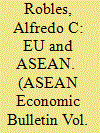| Srl | Item |
| 1 |
ID:
085713


|
|
|
|
|
| Summary/Abstract |
In May 2007, the EU and ASEAN agreed to launch negotiations for an FTA. In entering the negotiation process, it is obvious that the EU has learned lessons from its failed negotiations with Mercosur. Thus the EU sought to ensure that there was a consensual basis for the (positive) assessment of an FTA's consequences, and it insisted on setting a deadline for the negotiations. ASEAN has to learn two lessons from the EU-Mercosur experience. First, there is a difference between the EU's rhetoric and the reality of the negotiations. Second, there is a wide gap between the possible negative consequences of FTA and the assistance that the EU may offer to enable countries, firms and workers to cope with these consequences.
|
|
|
|
|
|
|
|
|
|
|
|
|
|
|
|
| 2 |
ID:
081220


|
|
|
|
|
| Publication |
2008.
|
| Summary/Abstract |
The EU claims that its free trade agreements with regional organisations of developing countries can promote the respective regions' integration into the world economy. Taking as case studies EU negotiations with the Southern African Development Community and Mercosur, the paper argues that the EU and its partners have different conceptions of integration into the world economy. For the EU the latter simply means multilateral trade liberalisation under the wto, while, for its partners, it involves increasing industrial production and exports of manufactured products. If the latter notion is accepted, an fta with the EU should increase European foreign direct investment into the region or at least increase their trade surpluses, thus increasing the resources available for support of local firms. The paper argues that an fta with the EU will not be likely to produce these results; thus the fta will simply be an instrument to promote market access for EU firms
|
|
|
|
|
|
|
|
|
|
|
|
|
|
|
|
| 3 |
ID:
054719


|
|
|
|
|
| Publication |
Aldershot, Ashgate Publishing Limited, 2004.
|
| Description |
xiv, 201p.
|
| Series |
International political economy of new regionalisms series
|
| Standard Number |
0754635570
|
|
|
|
|
|
|
|
|
|
|
|
Copies: C:1/I:0,R:0,Q:0
Circulation
| Accession# | Call# | Current Location | Status | Policy | Location |
| 048891 | 337.5904/ROB 048891 | Main | On Shelf | General | |
|
|
|
|